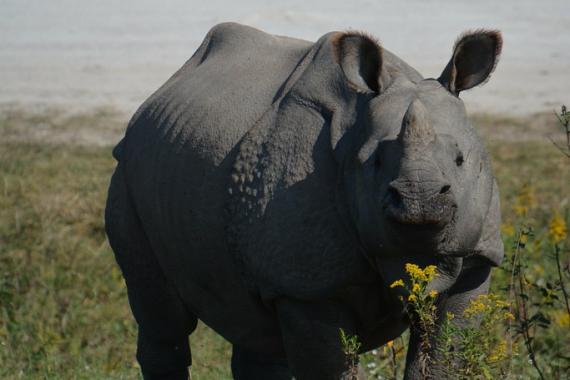Community-Based Anti-Poaching Operation in Nepal
Current initiative
Published

Greater One-horned Asian Rhino (Photo "DSC_3692" by bobosh_t is licensed under CC BY-NC 2.0)
Poaching of wildlife for illegal international markets was widespread in Nepal in 2002. In response, the Government initiated anti-poaching measures that involved local communities. Named ‘Community-Based Anti-Poaching Operation’ (CBAPO), the idea was to involve local people in patrolling and awareness raising to reduce illegal activities in wildlife reserves and national parks. Since implementation communities are actively participating in anti-poaching operations, with poaching greatly reduced. In 2014 Nepal achieved a zero poaching year for rhinos, tigers and elephants.
Lead
Location
CBAPO has been implemented throughout Nepal in wildlife reserves and national parks. Many communities live around these areas and rely on them for their livelihoods. Nepal is home to a number of threatened and high value species including elephants, tigers, rhinos and pangolins.
The poaching and wildlife trade problem
Species affected Greater One-horned Rhino Rhinoceros unicornis
Products in tradeRhino horn, ivory, pangolin meat and scales, and tiger parts are traded in international markets.
Overview of the problem
Wildlife poaching and the illegal collection of rare and threatened plant species are widespread in Nepal, occurring both inside and outside of protected areas. Certain high value species, such as rhinos, tigers and pangolins are at particular risk from poaching, driven by demand from international markets. In addition, fish poisoning is threatening the survival of aquatic fauna and parks are at risk of over-harvesting of both timber and non-timber forests products.
Usually, middlemen target poor local residents to carry out poaching and other illegal activities. The primary factors contributing to poaching are unemployment, a lack of awareness, poverty and volatile politics.
The anti-IWT initiative
After recognising that anti-poaching operations focussed on the involvement of park staff and security were insufficient to control illegal activities, the Government initiated anti-poaching measures that involved local communities and supporting agencies. Named ‘Community-Based Anti-Poaching Operation’ (CBAPO), the idea was to involve local people in wildlife conservation by allowing them to manage their own natural resources.
CBAPO first came about because the youth residing near protected areas were keen to involve themselves in anti-poaching activities, organising themselves into groups to mitigate poaching. CBAPO started in the Nawalparasi district in 2002/2003, which the youths soon declared as a poaching free area. Community-based anti-poaching units (CBAPUs) were subsequently set up.
CBAPO runs as a sub-committee of the Buffer Zone User Committee (BZUC), under Buffer Zone Management. There are now over 400 units working in Nepal who undertake regular patrolling, surveillance and data collection to protect wildlife from poaching. Capacity building training is also frequently conducted. Local poachers are included in the CBAPUs and forest monitoring teams, with the aim of self-motivating them to stop carrying out illegal activities.
Activities have since expanded to Shuklaphanta Wildlife Reserve (SWR), where CBAPO have played a vital role in the conservation of tigers and blackbuck, reducing illegal activities.
The strategy
Strengthening disincentives for illegal behaviour
CBAPUs carry out regular patrols to control illegal activities such as illegal logging, encroachment, and poaching. Patrol teams work with park staff using MIST (Management Information System) patrolling system and the presence of patrolling teams is enough to deter poachers.
In addition, CBAPUs regularly provide information to protected area authorities, allowing the park staff to surprise poachers, dealers and traders.
Increasing livelihoods that are not related to wildlife
CBAPUs organise skills development training and income generating activities, with the aim of minimising pressure on natural resources as well as raising the economic level of households.
Improving education and awareness
Has the initiative made a difference?
A survey carried out in SWR found that CBAPO are effective, particularly in raising awareness and seizing traps placed for wild animals and birds, as well as the rescue of wildlife. For example, poacher groups have been chased away and tiger traps destroyed. Similarly, the CBAPO of Khata Corridor apprehended four poachers from India and also seized a number of weapons and traps as a result of local community intelligence.
Patrolling, surveillance, information gathering, rescuing wildlife and raising awareness were the main activities of CBAPO which significantly contributed to achieving zero poaching at SWR. In particular, increased levels of awareness in the communities was the major achievement of CBAPO, as there has been a high level of participation of local people in conservation activities.
In implementing CBAPO, Nepal has proved to the world that zero poaching can be achieved through the participation of local people, achieving 365 days of zero poaching twice: in 2011 for rhinos, and for 12 months ending February 2014, for rhinos, tiger and elephants.
What works and why
The CBAPOs have worked well with other anti-poaching personnel based in protected areas.
Factors for success
Supportive, multi-stakeholder partnerships with a shared vision
What doesn’t work and why
A survey revealed that a lack of financial resource was seen as the greatest hindrance for carrying out tasks in a more organised and effective way.
In addition, more skills development training should be provided to the people of buffer zone. The morale of the CBAPO members also needs to be boosted through incentives, rewards, anti-poaching training and security assurance.
Factors that limited or hindered success
Lack of long-term donor support that is flexible, adaptive and/or based on realistic time goals
Organisers, donors and partners
WWF Nepal
For further information contact (peoplenotpoaching@gmail.com).